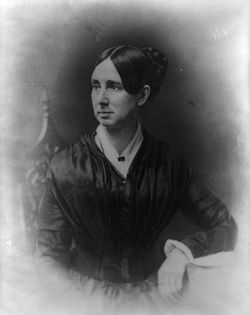
Bill for the Benefit of the Indigent Insane
Encyclopedia

The bill was the signature initiative of activist Dorothea Dix
Dorothea Dix
Dorothea Lynde Dix was an American activist on behalf of the indigent insane who, through a vigorous program of lobbying state legislatures and the United States Congress, created the first generation of American mental asylums...
, and passed both houses of congress in 1854, but was vetoed May 3, 1854 by president Franklin Pierce
Franklin Pierce
Franklin Pierce was the 14th President of the United States and is the only President from New Hampshire. Pierce was a Democrat and a "doughface" who served in the U.S. House of Representatives and the Senate. Pierce took part in the Mexican-American War and became a brigadier general in the Army...
, the first of his nine vetoes. Pierce argued that the federal government should not commit itself to social welfare, which he believed was properly the responsibility of the states.
The main provision of the bill was to set aside 12225000 acre (49,473 km²) of Federal land (10000000 acre (40,469 km²) for the benefit of the insane and the remainder for the "blind, deaf, and dumb", with proceeds from its sale distributed to the states to build and maintain asylums.
The initial request, on June 23, 1848, had been for five million acres (20,000 km²), which was subsequently expanded.
Context and legacy
The bill was part of the first wave of public mental health in the United States, which saw the establishment of asylums.The bill is seen as a landmark in social welfare legislation in the United States, Pierce's veto establishing federal non-participation in social welfare for over 70 years, until the emergency legislation and New Deal
New Deal
The New Deal was a series of economic programs implemented in the United States between 1933 and 1936. They were passed by the U.S. Congress during the first term of President Franklin D. Roosevelt. The programs were Roosevelt's responses to the Great Depression, and focused on what historians call...
of the 1930s, in the context of the Great Depression
Great Depression
The Great Depression was a severe worldwide economic depression in the decade preceding World War II. The timing of the Great Depression varied across nations, but in most countries it started in about 1929 and lasted until the late 1930s or early 1940s...
. Compare instead the county institution of the poor farm.
No further federal legislation on mental health occurred for over 90 years, until in 1946, the National Mental Health Act
National Mental Health Act
On July 3, 1946, Harry Truman signed the National Mental Health Act, which called for the establishment of a National Institute of Mental Health. The first meeting of the National Advisory Mental Health Council was held on August 15...
was passed, establishing federal mental health policy.
External links
- Senate Debates On The Land-Grant Bill For Indigent Insane Persons, February 21, 1854
- Veto Message (May 3, 1854), by Franklin Pierce
- Speech of Hon. John M. Clayton, of Delaware, on the veto message, by John Middleton Clayton

